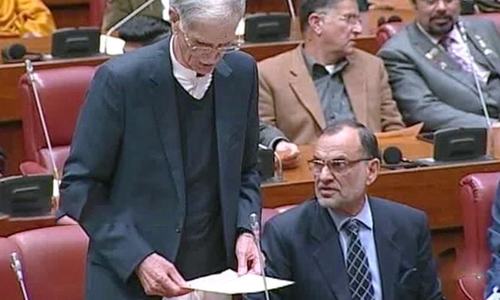PML-N leader Rana Sanaullah on Saturday said that his party should not have "become a part of government's undue haste" in the passage of bills pertaining to the tenure of services' chiefs.
In a press conference held in Lahore, Sanaullah rejected perceptions that the PML-N had dropped its stance of "vote ko izzat do" (respect the vote).
"We stand by [our stance] of vote ko izzat do and civilian supremacy," he insisted, in response to a question.
When posed with questions regarding the swift passage of the bills with overwhelming support from the opposition, both in the National Assembly and Senate, Sanaullah said that none of the parties opposed the decision to extend the army chief's tenure.
"Had there not been undue haste in taking this decision [...] and our parliamentary party also became part of that undue haste which, we believe [...] was a bit of an error. We should not have become a part of the government's undue haste, instead, we should have stopped it," he said.
"In the message he sent, Nawaz Sharif said that 'do not become a part of undue haste which makes it look like this parliament has become a rubberstamp'."
He said that the opposition leaders who opposed the bill had objections over the process adopted by the government, not the army chief's extension.
Earlier this week, the National Assembly Standing Committee on Defence unanimously approved the three bills concerning tenures of the services chiefs and the chairman of joint chiefs of staff committee. They were then tabled in the National Assembly and were passed even though religious party members, including Jamiat Ulema-i-Islam-Fazl (JUI-F), Jamaat-i-Islami and representatives from the erstwhile Federally Administered Tribal Areas (Fata), walked out of the NA declaring the lower house to be "fake".
The bills were then forwarded to the Senate, where they were passed in less than 30 minutes.
As per the amendments approved by both houses of Parliament, the appointment of the services chiefs and chairman, joint chiefs of the staff committee would be the prerogative of the prime minister and his decision to appoint, reappoint or extend the tenures of the chiefs and the chairman cannot be challenged in any court of law.
The upper age limit for a four-star appointment has been fixed at 64 years in case of reappointment and extension, otherwise the officer will retire at the age of 60 years.
The bills were moved by the government in the wake of a Supreme Court order issued in November last year, in which a three-judge bench had ruled that the parliament should pass legislation that would provide "certainty and predictability" to the post of the Chief of Army Staff for all times to come. The verdict was issued in a case pertaining to the prime minister's decision to grant a three-year extension to incumbent Army Chief Gen Qamar Javed Bajwa.














































